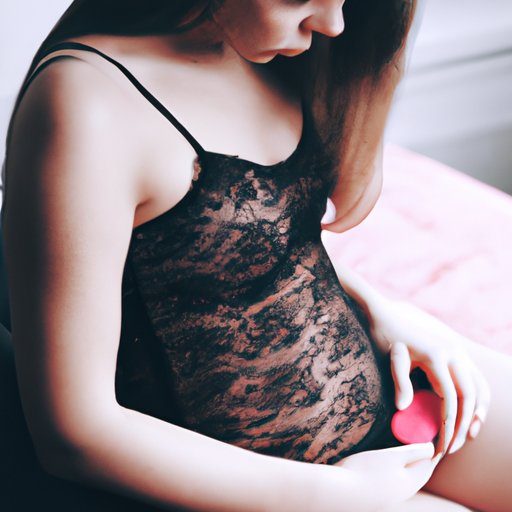
I. Introduction
For many women, the thought of becoming pregnant brings up a lot of questions. One of the most common is whether or not you can still get your period if you’re pregnant. There’s a lot of misinformation out there about this topic, so we’re going to set the record straight.
II. The Truth About Getting Your Period While Pregnant
Let’s start by defining what we mean by “getting your period.” Menstruation is the shedding of the uterine lining which occurs when an egg is not fertilized each month. Pregnancy, on the other hand, occurs when a fertilized egg implants in the uterus. The two are distinct biological processes that cannot occur simultaneously.
III. Can You Be Pregnant and Still Experience Menstruation? Debunking the Myths
Despite the fact that pregnancy and menstruation are separate processes, many people still believe in the myth that women can get pregnant while still experiencing their period. This is not true: once a woman has conceived, her body will not continue to menstruate.
Another common myth is that spotting or light bleeding during early pregnancy is a woman’s period. While it’s true that light bleeding can occur during pregnancy and can be mistaken for a period, this is not the same as menstruation. In fact, about 25% of women experience some bleeding during their pregnancy.
IV. What Does a Period Mean When You’re Pregnant? Understanding the Science
In order to understand why a woman’s body doesn’t continue to menstruate during pregnancy, we need to look at the science behind menstruation. Menstruation is triggered by a drop in hormone levels, specifically estrogen and progesterone, that occurs when an egg is not fertilized. When a woman becomes pregnant, her body produces high levels of these hormones in order to create a suitable environment for a growing fetus. This means that the hormonal changes that occur during pregnancy prevent menstruation from taking place.
V. Pregnancy and Periods: What Every Woman Should Know
Despite the fact that periods do not occur during pregnancy, many women do experience some form of bleeding during this time. This can be a cause for concern, but it’s important to remember that not all bleeding during pregnancy is a sign of a problem. In fact, light bleeding or spotting during early pregnancy can be a normal occurrence and is often caused by implantation bleeding as the fertilized egg attaches itself to the uterine wall.
However, if you are pregnant and experiencing bleeding, there are some things you should do. Firstly, you should contact your healthcare provider and let them know what’s happening. They will be able to provide you with advice on what to do next and can carry out tests to identify any potential problems. In some cases, bleeding during pregnancy can be a sign of a miscarriage or an ectopic pregnancy, so it’s important to get medical attention as soon as possible.
VI. Unexpected Bleeding During Pregnancy: Is It a Period or Something More Serious?
It’s important to note that not all bleeding during pregnancy is the same. While some women may experience light spotting, others may experience bleeding that is more similar to a period. This can be indicative of a more serious problem, such as a miscarriage or placenta previa.
If you experience bleeding that is similar to a period, it’s important to contact your healthcare provider right away. They will be able to advise you on what to do next and may perform additional tests to determine the cause of the bleeding.
VII. The Connection Between Ovulation and Pregnancy Dysfunctions that Cause Bleeding
The reason for bleeding during pregnancy can vary and is often related to hormonal changes. Hormones play an important role in both ovulation and pregnancy, and imbalances can cause bleeding. Additionally, there are a number of conditions that can impact a woman’s ability to conceive or carry a pregnancy to term, which can lead to bleeding.
Common issues that can cause bleeding during pregnancy include endometriosis, uterine fibroids, and polyps, which can interfere with the implantation of the fertilized egg. Hormonal imbalances, such as those caused by thyroid dysfunction or diabetes, can also contribute to bleeding during pregnancy.
VIII. Why Some Women Get Their Periods During Pregnancy (And Others Don’t)
While it’s true that the majority of women do not experience periods during pregnancy, there are some cases in which bleeding can occur. This is often due to fluctuations in hormone levels or other factors that can impact a woman’s menstrual cycle. In some cases, women may experience light bleeding or spotting that is similar to a period. However, this is not true menstruation, as we’ve already established.
Factors that can impact whether or not a woman experiences bleeding during pregnancy include age, weight, and overall health. Some women may be more prone to hormonal imbalances or other conditions that can cause bleeding during pregnancy.
IX. Conclusion
In conclusion, it’s important to remember that pregnancy and menstruation are two separate biological processes that cannot occur at the same time. While some women may experience bleeding during pregnancy, this is not the same as menstruation. If you are pregnant and experiencing bleeding, it’s important to contact your healthcare provider and seek medical attention.
Remember, every woman’s body is different, and what’s normal for one person may not be normal for another. If you have any concerns or questions about bleeding during pregnancy, don’t hesitate to reach out to your healthcare provider for advice and support.




